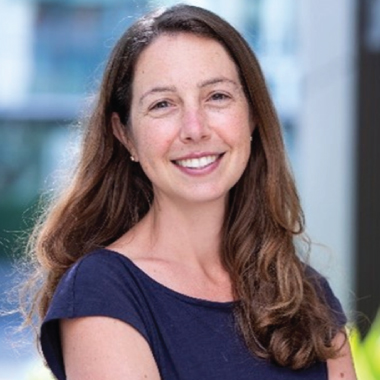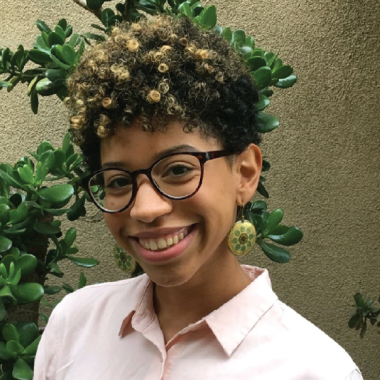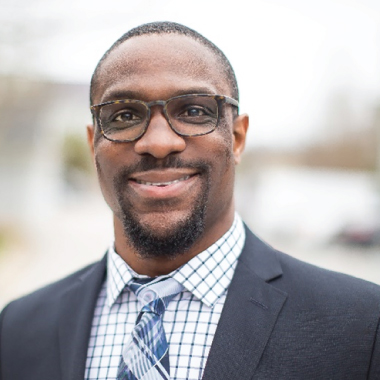Alumni Highlights

Nadia Diamond-Smith
PhD ' 2014
Current employer and job title: University of California, San Francisco, Associate Professor, Department of Epidemiology and Biostatistics and Institute for Global Health Sciences
Location: San Francisco, California
What was your favorite academic experiences as a PFRH student?
Making lifelong friendships with my cohort-mates. More officially in terms of academics, the mentorship from faculty was amazing and opportunities to work with a variety of innovative thinkers and leaders in the field were hugely beneficial. Many former professors have been long time colleagues and friends, including most importantly my primary advisor David Bishai who is a lifelong mentor and friend who I look to for advice regularly.
What advice would you give to current PFRH students?
I would say don’t overthink too much what your dissertation will be on, just focus on finishing it. It’s just one set of many sets of papers you will write, and while important, it’s not going to define your career. Try to work on a variety of projects and apply the skills you gain in courses to things outside of class so you really have a chance to learn it. Enjoy the time, there is no other time like it!
What was the topic of your master’s essay or dissertation? What were your main findings and/or the key implications of your work?
My dissertation was on understanding changing patterns of child sex ratios in India. I used Indian census data and sample registration survey data primarily, and demographic and health survey data from India for 1 paper. I was primarily interested in if there is any evidence that once child sex ratios get very imbalanced (favoring boys), people start changing their behavior and start having more girls. My first paper (published in Demography) showed that when sex ratios get very skewed they then start to correct and become somewhat more equal. I also looked in detail at time and geographic patterns in child sex ratios, and did a decomposition of changing patterns due to sex selective abortion compared to excess girl child mortality.
What is the most exciting aspect of your career and/or current position?
I am mostly doing research in my current position, and I love the ability and freedom to pursue the research priorities that I believe are most important, informed by findings and voices of participants and communities with which I work. In other words, I have the intellectual and academic freedom to do the work that I think and the evidence suggests needs to be done. I work on a variety of project, have amazing collaborators all over the world, and get to do work that I am passionate about.
You are an outstanding alumni of PFRH. Of what professional accomplishment(s) are you most proud?
I am very proud of the partnerships and collaborations with colleagues globally and in the US as well (including students, post-docs, etc.). Along with these amazing partners, in this past year I was awarded 3 R01s in India to pursue research and intervention projects that I have been building toward for many years, including one focused on empowerment for newly married women, a population that I am very interested in.
How did your PFRH degree prepare you for your career path?
Of course the list is long here, and I have already mentioned the wonderful mentorship that I received and how much I learned about collaborating and partnerships from them. One thing that I do think is unique about PFRH is how well it prepares students to speak up and defend their ideally orally. Most programs teach students how to write great papers and do smart analyses, but PFRH has more expectations in terms of oral defense of proposals and ideas (at least it used to!) and I thought that the experience of having multiple oral exams was very helpful. There is only so much impact you can have with a paper if you can’t articulate your arguments and ideas in real time as well.

Grace Guerrero Ramirez
MSPH '2019
Maternal, Fetal, and Perinatal Health
Current employer and job title: Mathematica, Advisory Services Analyst, Human Services Unit
Location: Oakland, California
What was your favorite academic experiences as a PFRH student?
The mentorship I received throughout the program, informative and thought-provoking lunch and learn sessions, and my practicum experience under the guidance of Dr. Allison West.
What advice would you give to current PFRH students?
Be open to experiences that are outside of your comfort zone or unfamiliar to you. This is applicable to your academic and professional adventures. An exciting, yet overwhelming, part of public health is that there is so much to explore and learn about, including career pathways. Take your time to experience different work environments and areas of interest – know that it’s okay to feel a little lost on what the next best step is after grad school. Frankly, there is no one right way. I found very fulfilling professional experiences in unexpected roles and topics – for example, public health workforce development. In retrospect, I’m glad that I opened myself up to those types of opportunities. At the time, I was hesitant about them because they didn’t conform to my expectations of where I should’ve been at that point. Wherever you go, experience different skills, subject matter areas, and settings. Don’t be afraid to ask questions, and, above all, have fun!
What was the topic of your master’s essay or dissertation? What were your main findings and/or the key implications of your work?
My master’s essay discussed the experiences of home visitors and child welfare staff working with families with substance-exposed newborns. As part of this qualitative research project, I explored the extent to which home visitors and child welfare staff collaborated and communicated with one another to provide services to families. Findings identified opportunities for improvement in program staff supports, communication and collaboration across agencies, and trauma-informed and equitable services for families.
What is the most exciting aspect of your career and/or current position?
I get to do work that has impact and is meaningful. One of the aspects of my work that I value is that I have a say on the type of projects that I want to work on. I’m also a proud public health generalist! My work spans qualitative research, technical assistance, and program evaluation in sexual and reproductive health, home visiting and child care, community conflict mediation, and human services programs. The most exciting aspect of my role is that I can engage with communities and individuals that are leading and/or are affected by this work. It’s been humbling and exciting to learn from grantees, community service providers, and people who have direct experience with the issues that we aim to address. For example, I interviewed family, friend, and neighbor child care providers to understand the important work that they do and the supports they need to better support families in their community. I also supported the implementation of an Equity Technical Assistance Center for federal staff in health and human services. I partnered with experts with lived experience to inform the implementation of the Center and disseminate strategies to engage community members in federal work.
You are an outstanding alumni of PFRH. Of what professional accomplishment(s) are you most proud?
As a Fellow at the de Beaumont Foundation, which was my first work experience after grad school, I edited a book titled Public Health Under Siege: Improving Policy in Turbulent Times. Partnering with experts in public health to create this book was an amazing opportunity, especially this early in my career. Recently, I worked closely with community experts and colleagues to publish a set of briefs for the Office of the Assistant Secretary for Planning and Evaluation. These briefs highlight strategies to advance equity in health and human services programs. Strategies include ways to infuse the expertise of communities and individuals who are affected by these programs in policy, research, and practice.
How did your PFRH degree prepare you for your career path?
PFRH training helped me develop critical thinking, allowed me to participate in research in a way that gave me a sense of ownership and leadership, and built my skills in program evaluation and writing. These experiences have been a driving force in my career. I still refer to courses and practicum experience in qualitative research and evaluation because they gave me practical skills that I routinely use – for example, conducting interviews with agency staff or assisting organizations in refining logic models.

Lawrence Reid
PhD '2015
Current employer and job title: Agency for Health Research & Quality (AHRQ), Epidemiologist
Location: Rockville, MD
What was your favorite academic experiences as a PFRH student?
Defending my dissertation! lol.
In all honesty, I really enjoyed working with PFRH staff, particularly Donna Strobino, Cynthia Minkovitz, Bob Blum & Phil Leaf of the Urban Health Institute, and Carlos Castillo-Salgado in the Epi department. Through the UHI, I worked closely with the Baltimore City School district, which turned into a great job post-graduation.
I also loved the opportunity to mentor local high school students through the School of Medicine’s Brotherhood Alliance for Science and Education (BASE) mentoring program.
What advice would you give to current PFRH students?
Take advantage of all that Johns Hopkins, not just JHSPH, has to offer; it’s a great university.
What was the topic of your master’s essay or dissertation? What were your main findings and/or the key implications of your work?
My dissertation examined whether low birth weight and preterm birth are related to school readiness in a population-based sample of Baltimore City kindergarten students and assessed how the type of childcare moderated this relation. I found that readiness scores were lower for children born LBW and PTB and that the type of childcare prior to kindergarten enrollment was an important independent predictor of readiness scores. The study was published in the Maternal and Child Health Journal here.
What is the most exciting aspect of your career and/or current position?
I love the opportunity I get to apply the population health and social epidemiology skills to real world hospitalization data with a focus on improving maternal healthcare and outcomes in my current role on the Healthcare Cost & Utilization Project (HCUP) at AHRQ. Likewise, in my previous role as Director of MCH Epidemiology at the Maryland Department of Health, it was exciting to direct efforts to improve MCH outcomes across the state and work with local health departments. The opportunity to see your work help reduce infant and maternal deaths and improve health outcomes for the MCH population is very rewarding.
You are an outstanding alumni of PFRH. Of what professional accomplishment(s) are you most proud?
I’m really proud of the work I did at the Maryland Department of Health, where as the Director MCH Epidemiology, I helped enhance the use of administrative data to improve state and local health department efforts to prevent infant deaths and improve maternal and child health outcomes. In particular, I led the development of maternal and infant health county profiles which utilized perinatal periods of risk (PPOR) methods to highlight local geographic hotspots at risk of poorer maternal and infant health outcomes. My work on severe maternal morbidity (SMM) in Maryland and at currently at the federal level also continues to be an area of my work I’m particularly passionate about.
How did your PFRH degree prepare you for your career path?
The Population Health track in PFRH along with Epidemiology coursework provided me the methodological foundation for leveraging administrative data to improve community health. I was also fortunate enough to be the recipient of the MCH Epidemiology Doctoral Research Training Grant from Health Resources and Services Administration (HRSA) which provided me the additional knowledge base to be an effective MCH Epi researcher.
